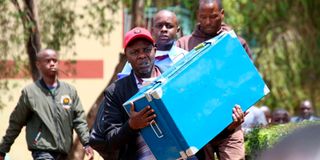How to deal with the extra charges problem in our secondary schools

A parent carries a metal box for his son during the admission exercise at Nyeri High School on May 4.
What you need to know:
- These costs can and often lead to some students dropping out of school.
- The Education ministry should constantly monitor the unit costs of maintaining students in school.
At the start of each academic year in secondary schools, reports abound of Form One students who risk failing to be admitted because they lack finances to pay school fees. This leads to interventions by neighbours, friends, leaders and well-wishers who volunteer to assist these students, especially when such cases are highlighted through the media.
It’s time stakeholders took a critical look at this issue. The expenses every student incurs in these schools is shared between the government and the parents and disaggregated to vote heads such as boarding fees, tuition fees, personnel emoluments and activity fees, just to mention a few.
The Ministry of Education is always under pressure from principals to increase either or both school fees and capitation in order for the schools to meet all the necessary expenses. The government, on the other hand, is sensitive to the fact that increases in school fees would marginalise the poor yet it has consistently pledged to ensure 100 per cent transition of learners from primary to secondary school. The ministry has to strike a balance between these two countervailing forces.
There are, however, other charges that are fully borne by the parents in addition to items that the students are required to buy. These include uniform fees, motivation fees, and development fees, among others.
These costs can and often lead to some students dropping out of school.
Additional levies
Take motivation fee for example. Quite a large number of schools charge between Sh1,000 and Sh5,000 per term, especially as the students get to Form Three. This is normally paid to teachers, supposedly to motivate them to put in extra time and effort to teach or coach students to improve performance. Ideally, teachers who’ve been trained and employed by the government should be motivated to teach without extra inducement.
However, the payment of this fee is so entrenched in the school system that even senior Education officials in the ministry, who are supposed to ensure that schools don’t charge additional levies, pay for their children the same levies in public schools.
At the individual level, such officials agonise on whether to stand firm and implement government directives at the risk of their children being ostracised, or enrol the children a private school that may be charging more fees. The ministry has been reduced to a passive observer rather than a regulator on this matter. So, what is the way forward?
To me, stakeholders need to consider the following issues. First, the Education ministry should constantly monitor the unit costs of maintaining students in school. Thereafter, a decision, say every three years, has to be made on how to share these costs between the government and the parents.
Secondly, the Teachers Service Commission (TSC) has to re-examine teachers’ motivation. Are teachers demanding the allowance because they’re overworked, underpaid or both, or is it just an extra revenue stream? If, indeed, they’re overworked, can TSC and the Salaries and Remuneration Commission introduce a motivation allowance to spare parents this cost?
Thirdly, parents need a stronger and more assertive association. The legal and structural composition of the Kenya National Association of Parents may need to be reviewed so that its mandate is recognised and dovetailed into the mandate of the ministry to promote synergy in the sector.
Fourth, the Education ministry needs to carry out a more aggressive audit in schools to identify serious cases of abuse of user charges and ask TSC to take disciplinary action against the school management. It happened for 24 years through the Efficiency Monitoring Unit under a strong director, Mr B. N. Rweria and the full support of the Permanent Secretary, Secretary to the Cabinet and Head of Public Service Richard Leakey, who has since died. The principals paid attention and corrected themselves. But then that was a different generation. It’s time to revisit this strategy.
Mr Sogomo, an education expert, is a former Secretary of TSC. [email protected]. @Bsogomo





